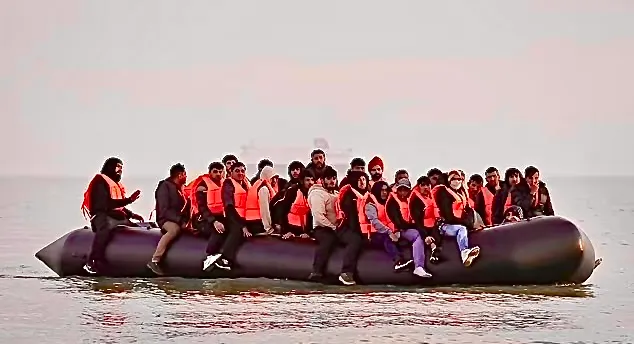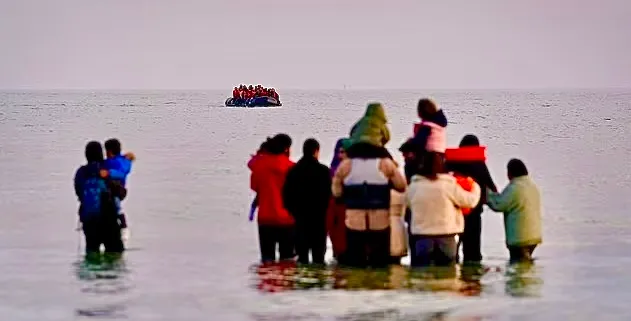Rwanda Plan Was Working — Labour Axe Sparked Migrant Surge!
New Home Office data has now confirmed that the Rwanda scheme was deterring illegal Channel crossings before Labour scrapped it—now arrivals have surged to unprecedented levels.
So, following on from the rather terrifying admission by Labour’s Defence Secretary John Healey that Britain has now:
"LOST CONTROL OF IT’S BORDERS".
We are today presented with further evidence that confirms what many suspected — namely, that the Conservative Government’s Rwanda scheme had in fact begun to act as a credible deterrent to illegal Channel crossings. Not in theory. Not in speeches. But in cold, statistical fact.
Research just released by the Home Office, alongside analysis from migration specialists, now exposes the true extent of Labour’s strategic blunder — scrapping a policy that, by and all emerging metrics, had started to very effectively do precisely what it was designed for: dissuade would-be illegal entrants from embarking across one of the world’s busiest and deadliest shipping lanes in inflatable dinghies.
The figures speak clearly. May 2023 — a month boasting a record 21 so-called 'red days' of calm weather — saw only 2,765 arrivals. That’s roughly in line with the previous two months when weather conditions were considerably poorer.
A fluke, perhaps? June followed, with 20 more red days and just over 3,000 arrivals. These were the critical weeks just after the Conservative government’s Safety of Rwanda Act passed into law, effectively clearing the final legal hurdles that had long dogged the policy. And the result? A deterrent effect so visible it could probably be seen from space — or at least from the French coastline. With many would be illegal immigrants in France, even saying they where delaying their treacherous channel crossing, to see if Labour got into power first.
Fast forward to July. Sir Keir Starmer assumes power, and within days, the Rwanda removals policy is axed — shelved, dismantled, politically obliterated. The messaging to criminal smuggling gangs and undocumented would-be arrivals could not have been clearer if Labour had launched a commemorative stamp: Britain is back open for illicit business.
Since then, illegal Channel crossings have exploded. This year is already on course to break all previous records. Saturday alone saw 1,195 arrivals — the fifth highest daily total ever recorded, and the first to cross the 1,000 threshold in over two and a half years. Yet Labour's response to this sharp increase? A curious claim that the surge in numbers is due to, of all things, the weather. Apparently, the thermodynamics of a warm summer breeze now shoulder the blame for Britain’s border crisis.
The Home Office, under Labour, released new data claiming that crossings ‘tended to coincide’ with calm conditions at sea. But there's a problem. When you compare the so-called red days from this year to last, the results don’t back that theory.
Between January and April 2025, there were 60 red days — more than double the 27 in the same period of 2024. But the increase in crossings? A staggering 46 per cent rise. The implication being that even though the weather is a factor in the timing of crossings, it is not the root cause of their scale.
Dr Peter Walsh of the Oxford Migration Observatory weighed in — though, mercifully, not with another weather forecast. His analysis confirms the obvious: the long-term surge in small boat arrivals has very little to do with red days and far more to do with the underlying incentives. Incentives like whether the UK Government might put you on a one-way flight to Kigali.
As Shadow Home Secretary Chris Philp rather bluntly put it, the Rwanda plan hadn’t even got off the runway, and yet the sheer threat of it was already discouraging migrants. That threat is now gone. Replaced, perhaps, with a prayer for rain.
The figures don’t lie. But governments might. And with Labour's decision to axe the scheme, one is left wondering whether policy now hinges less on outcomes and more on optics. It’s not that they believe the Rwanda scheme wouldn’t work — the data now proves it was working — it’s that they didn’t want it to work. Ideological purity, it seems, trumps immigration control.
The situation has also laid bare a rather peculiar contradiction. For years, opponents of the Rwanda plan claimed it would never deter migrants because it was too “inhumane.” And yet now, confronted with statistics showing it did deter migrants, the same critics suddenly deny that deterrence happened at all. Apparently, the only thing more dangerous than a dangerous Channel crossing is a politically inconvenient truth.
Labour has, in effect, gambled border control on a theory of meteorology. A strategy based on hoping for high winds, rough seas and poor visibility.
In the absence of a serious alternative, that seems to be the plan: pray for storms. A curious replacement for a national border policy, and one more commonly found in pirate films than Whitehall briefings.
One might have hoped that a new government would bring new ideas. Instead, what we've seen is the immediate and catastrophic dismantling of a system that was — finally — beginning to show results. The boats are back, the smugglers emboldened, and Britain’s border integrity hangs in the balance.
But at least the sun is shining.
Well, that’s all for now. But until our next article, please stay tuned, stay informed, but most of all stay safe, and I’ll see you then.







